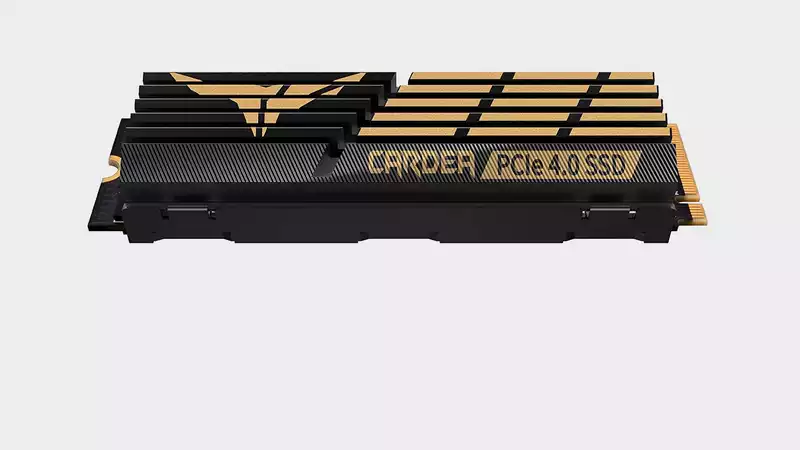It seems like just yesterday that PCIe 3.0 SSDs that hit 3,500 MB/s were impressive. But that was 2019; PCIe 4.0 drives now dominate the high-performance SSD market, and Teamgroup continues to make strides with its well-rounded product portfolio. The company's Cardea A440 is one of the newer drives at the top of its product stack, featuring the Phison E18 controller.
The Cardea A440 is a standard form factor 2280 (80mm long) M.2 drive connected via a PCIe 4.0 x4 interface. Key specs, at least for the 2TB model we will review here, are sustained read/write speeds of 7,000/6,900 MB/sec respectively.
This is fast enough to maximize the capabilities of PCIe 4.0 x4 links. However, the inexpensive 1TB model has a slightly slower write speed of 5,500 MB/sec.
What makes the Cardea A440 stand out is the choice of heatsinks. This is welcome, as it means it can be used in a variety of systems and laptops. You can choose between a chunky metal heatsink or a thin graphene-based strip. Being a high-end drive, it is expected to be installed in systems with motherboard-based heatsinks, but can be left bare if you prefer. [The Cardea A440 SSD uses Micron's 96-layer TLC NAND. The 2TB drive also has a 2GB DRAM buffer, which is superior in performance to budget drives that have started to remove the DRAM cache.
As mentioned earlier, this drive is built around a Phison PS5018-E18 memory controller. This 8-channel PCIe 4.0 controller is key to the performance of the Teamgroup SSD. It is a new 12nm design and should help address the undesirable heat generation characteristics of high performance M.2 drives. Let's see if it has what it takes to challenge the Western Digital SN850 and Samsung 980 Pro.
The 2TB Cardea A440 features a very competitive endurance rating of 1,400 TBW and a 5-year warranty. This endurance rating is better than the WD SN850 and Samsung 980 Pro, both of which are 2TB models with 1,200 TBW. You wouldn't expect home users to abuse their drives this much, though.
The Cardea A440's sequential performance approaches the limits of what is possible with PCIe 4.0 x4 links, with read speeds of 7 GB/sec and write speeds of 6.7 GB/sec.
Digging deeper, the A440 delivers very good 4K write performance and strong low queue depth write IOPS results. However, it falls short of the top-performing SN850 and 980 Pro in low queue depth read performance. This is the point where Intel's former Optane drives won many fans.
This is also demonstrated in our Final Fantasy game loading time tests and PCMark 10 storage tests, where Phison-based drives lag a bit behind fully in-house designed WD and Samsung drives. But that is not to say that the A440 is bad. It is not.
The A440's write performance is better than any drive on the market. There may be firmware updates in the future that will further improve the Cardea.
Performance is important, but it is useless if the drive overheats and slows down. With the included large heatsink, peak temperatures were 63°C under heavy sustained write loads. This is a real strength of the drive, as the heat sink-less design of other drives can cause throttling issues unless properly cooled by the motherboard heatsink.
The Teamgroup Cardea A440 may not offer the best value on the market, but it offers excellent performance.
Its write performance is better than any other drive on the market, and it shines under sequential loads, but it is no match for the WD SN850 or Samsung 980 Pro in read performance.
However, we are at a point where high-speed NMVe drives offer so much in terms of sequential, random, and IOPS performance that it is becoming difficult to distinguish between them.
So things like endurance rating, price per gigabyte, and operating temperature become important. looking at the A440, its endurance rating of 1,400 TBW is very good, and its operating temperature is better than the similar Adata S70.
At the time of this writing, however, its price is a bit high for our taste: at $423, the Cardea A440 2TB is in stiff competition with the less expensive Samsung 980 Pro ($397) and Phison E18 drives from Corsair and Gigabyte. competition. However, these drives do not have the flexible cooling options of the Team A440, and this fact alone should appeal to many users.
As always, prices are subject to change and are expected to drop a bit more once the A440 becomes more widely available.
If you are looking for maximum write performance or are impressed with the choice of cooling options, the Teamgroup A440 could really help. Gamers will likely be attracted to its class-leading read performance, but all things considered, the A440's strengths lead to a solid recommendation from us.
.

Comments